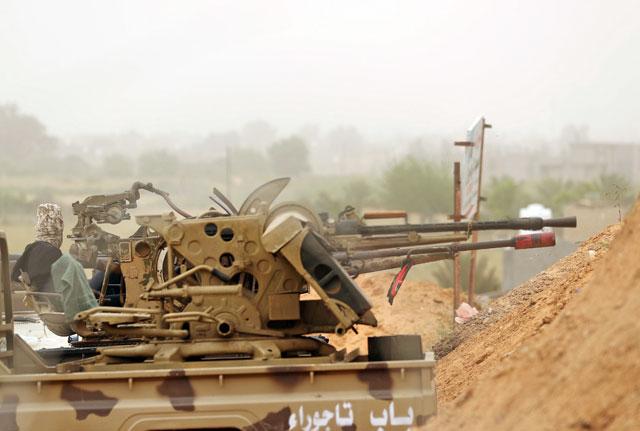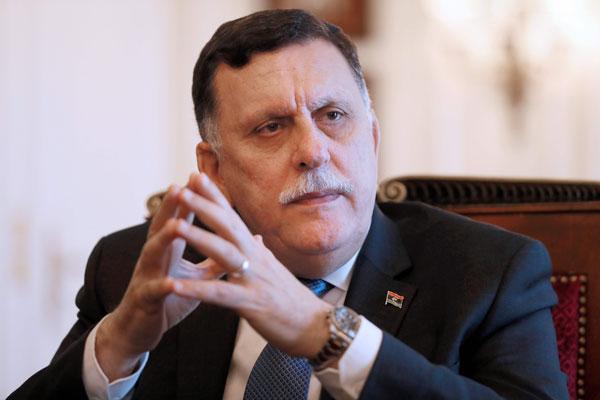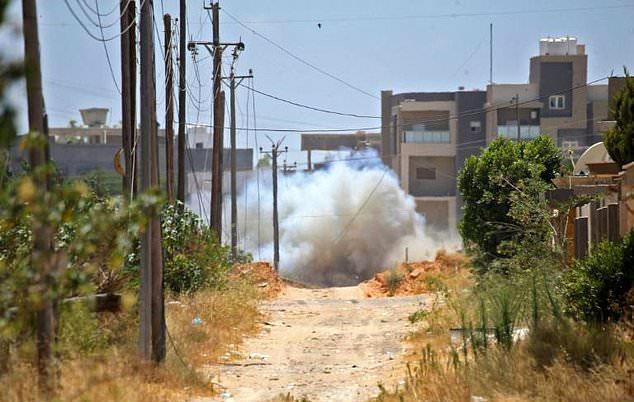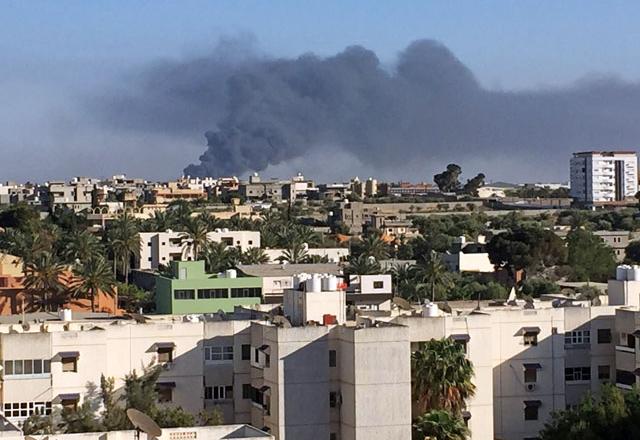You are here
Libyans charge France with double dealing over Haftar
By AFP - Apr 22,2019 - Last updated at Apr 22,2019

Members of the internationally-recognised Libyan government forces take position during the fighting with the eastern forces in Ain Zara, in Tripoli, Libya, on Sunday (Reuters photo)
TRIPOLI — Libya's unity government has bitterly criticised France for its stand in the offensive on Tripoli by the forces of Khalifa Haftar, accusing Paris at least tacitly of backing the military strongman.
Last week, unity government Interior Minister Fathi Bach Agha charged that France was supporting "the criminal Haftar", and announced that the Government of National Accord (GNA) was cutting security ties with Paris.
His comments triggered surprise, and a swift denial from the French embassy that the allegations were "unfounded".
But while France's role remains ambiguous, analysts say Paris sees Haftar and his self-styled Libyan National Army as a potential stabilising force in a country rocked by years of conflict.
Haftar's forces in early April launched their assault on Tripoli, seat of the internationally-recognised GNA, pledging to clear the capital of "mercenaries and terrorists".
"Since 2016 the GNA has made no headway in addressing the problems it was meant to solve first, i.e. breaking the vice grip of the militias over Tripoli, containing extremism and stopping the free-fall of the Libyan economy," former US diplomat Ethan Chorin told AFP.
‘Order from chaos’
Haftar, on the other hand, "has proven he can create order from chaos — but at a high cost, in terms of human rights and freedom of expression", he said.
Haftar is seen by his allies, who also include Russia and Libya's eastern neighbour Egypt, as a bulwark against Islamists who gained a foothold after the 2011 uprising that ousted and killed dictator Muammar Qadhafi.
A Qadhafi-era military commander who spent two decades in exile in the United States, he returned to Libya in March 2011 and later brought together a coalition of armed factions to battle terrorists.
France, hit by a string of Daesh group attacks, backed Haftar's forces as they battled Daesh and other militants in Libya.
Jalel Harchoui, a Libya specialist at the Clingendael Institute in The Hague, said France backed Haftar's efforts with "military advisers on Libyan soil, who provide assistance with training, surveillance and targeting of strikes".
French military aid
France was forced to admit that it has provided military assistance to Haftar after three French troops were killed in Libya during an intelligence-gathering mission in 2016.
Eventually, it was a coalition of armed groups under GNA command that ousted Daesh from its bastion, Qadhafi's hometown of Sirte, on the coast between Tripoli and Haftar's eastern stronghold.
But Haftar's own successes against jihadist groups, notably in the second city Benghazi, earned him admirers in Paris, where officials worried about the regional impact of Qadhafi’s fall.
"I don't think the French have had any illusions... about Libya's potential to destabilise large regions within Francophone Africa," Chorin told AFP.
"The rapid spillover of the Libya conflict into Mali, and the French intervention in that country is a perfect example."
Paris has since hosted Haftar several times, including for a peace conference with GNA leader Fayez Al Sarraj in May 2018.
Harchoui said "red carpets and applause" from France have helped give Haftar the status of a "respectable and responsible statesman".
"This political and diplomatic aspect of the support from Paris was perceived by Haftar's faction as an encouragement to wage war," he added.
Sights on Tripoli
Haftar, who backs an eastern-based administration that refuses to recognise the GNA, has steadily expanded his control of Libya.
Following a thrust southwards early this year, he says he now controls some 90 percent of the country and has turned his sights on the capital.
Despite condemnations from world powers, "it is clear that some countries, including France and the United Arab Emirates, are saying one thing publicly while privately hoping that Haftar's actions will jolt Libya out of its deep political malaise", Chorin wrote in a blog post published by Foreign Affairs last week.
Haftar's offensive, which the UN says has claimed over 200 lives, and France's alleged support, have sparked public opposition in western Libya.
Hundreds of Libyans held a protest against France in Tripoli on Friday, sporting trademark yellow vests of French anti-government demonstrators and condemning both France and "war criminal" Haftar.
But for analyst Anas Al Gomati, the White House's announcement last week that US President Donald Trump had spoken by phone with Haftar could ease the pressure on Paris.
"France will be delighted that Trump can absorb the diplomatic responsibility for Haftar's power grab and remove the diplomatic scrutiny on their four-year relationship with Haftar," he said.
Related Articles
PARIS — Libyan Prime Minister-Designate Fayez Sarraj says military strongman Khalifa Haftar, who controls the north African country's main o
TRIPOLI — Mines have killed or wounded more than 100 people, including many civilians, south of Libya's capital following deadly combat betw
TRIPOLI — Libya's internationally recognised government said Monday its head Fayez Al Sarraj will tour Europe to seek support against an att














